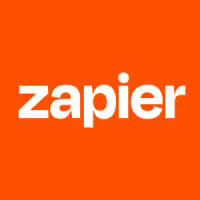Hunter Alternatives
This guide compares 10 Hunter alternatives. We review features, pricing, and data to help you find the right email finder for your business.
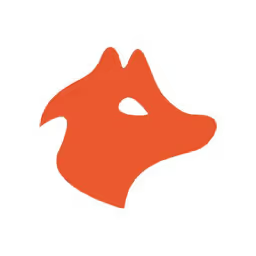
Many people use Hunter for good reasons. It performs well when you need to find and verify professional emails or run outreach campaigns. Its ease of use is a big plus for many teams who want to get started quickly.
However, no tool is perfect. Some users mention its contact database can be limited, and data quality is sometimes inconsistent. That's why we analyzed the top alternatives to help you find the right fit for your needs. Let's get started.
Consider 11x for Your Sales Digital Workforce
Consider 11x if you want to add digital workers to your sales team. The platform provides specialized agents designed to handle specific sales functions, which can supplement your existing outreach efforts.
The 11x platform is a unified GTM solution with AI agents that manage sales tasks. For instance, Alice finds prospects, handles outreach on email and LinkedIn, and keeps the CRM updated. Julian qualifies inbound leads and books meetings.
This approach replaces separate point solutions for data enrichment, outreach, or email warmup. 11x unifies these functions on one platform.
Hunter Alternatives
The following sections review the top Hunter alternatives. We analyze each tool's pricing, main features, and its advantages and drawbacks compared to Hunter.
1) Apollo.io
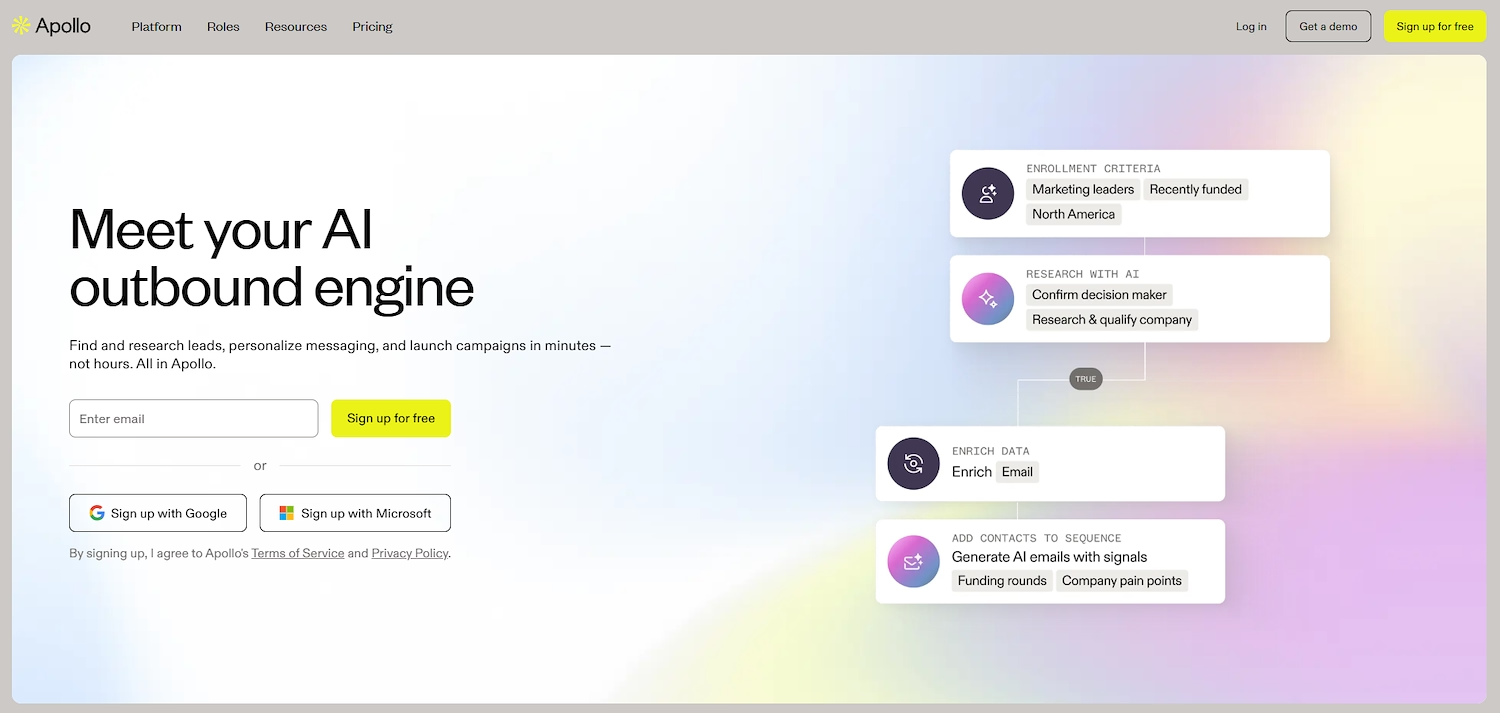
Apollo.io is a sales intelligence platform. It offers a contact database for teams to find prospects and verify their information. The tool supports sales outreach campaigns as well.
Its main use cases revolve around lead generation and engagement. The platform unifies data and outreach tools to help businesses execute their go-to-market plans.
Apollo.io's Main Features
- Offers a contact database to find and verify prospect information.
- Includes tools to build and execute sales outreach campaigns.
- Unifies prospect data with engagement tools on a single platform.
How Apollo.io Compares to Hunter
Average Review score: 4.7/5 stars based on 8,904 G2 reviews.
- Apollo.io provides access to a larger contact database with over 210 million contacts, which can offer more lead opportunities compared to Hunter's database.
- The tool combines a contact database with a full sales engagement suite, unlike Hunter, which has a primary focus on email discovery and verification.
- It offers buyer intent data to identify prospects who actively research solutions, a feature that provides more targeted leads than basic contact discovery.
- The platform includes advanced features like lead scoring to help teams prioritize prospects, a function not central to Hunter.
Where Apollo.io Compares to Hunter
- Some users find Apollo.io has a steeper learning curve due to its extensive features, unlike Hunter's more straightforward user experience.
- Its vast database sometimes includes outdated contact information, while Hunter's focused email verification may offer more accuracy for that specific task.
- The platform's all-in-one nature can be complex for teams that only need email lookup, where Hunter offers a more dedicated tool.
Pricing and Cost-Effectiveness
Both platforms offer a free plan and an entry-level paid tier at $49 per month. However, Apollo.io's Professional plan is $79 per month, while Hunter's comparable Growth plan is $149 per month. This positions Apollo.io as a more cost-effective option for teams needing to scale beyond a basic package.
2) Snov.io
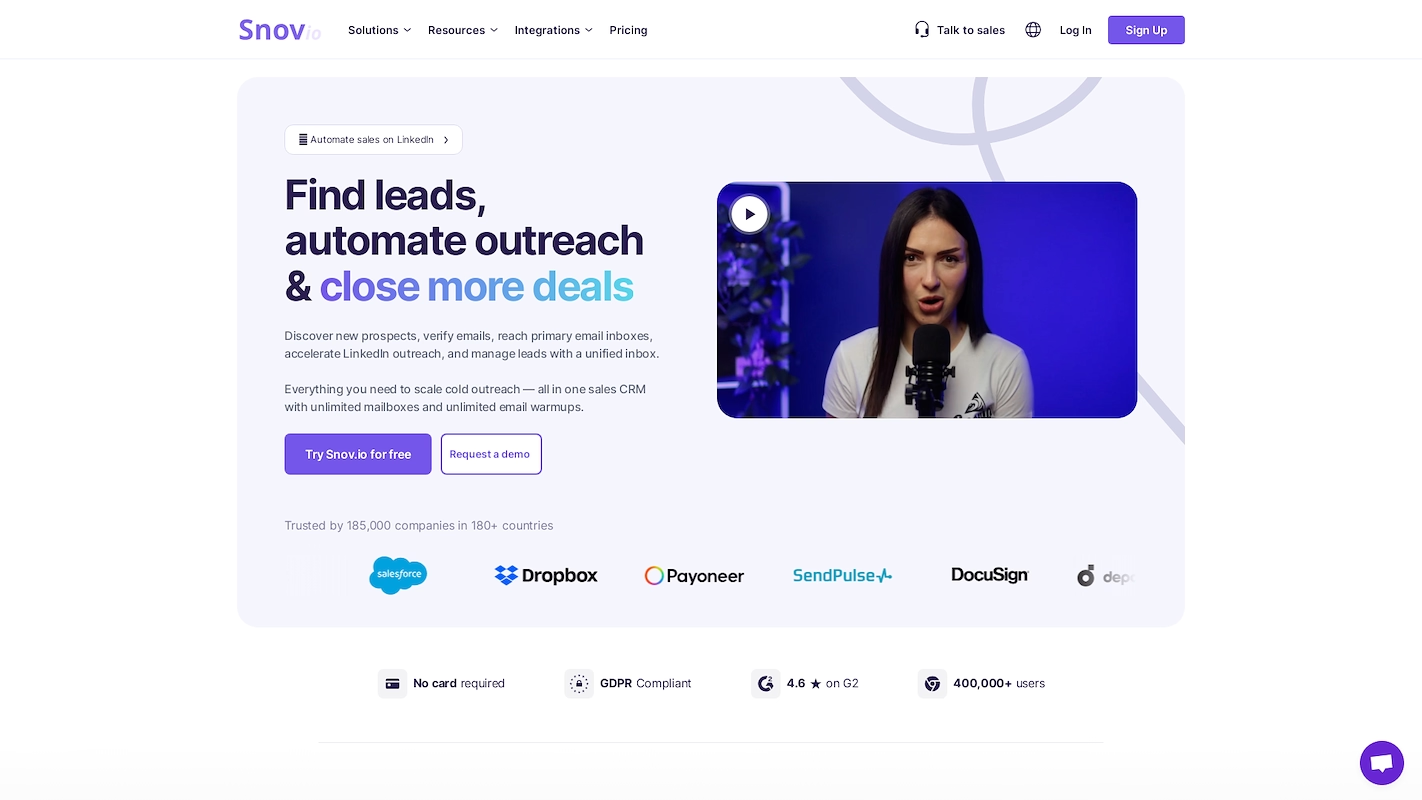
Snov.io is an all-in-one sales and outreach platform. It unifies lead generation, email verification, and multichannel outreach tools in a single workspace. Businesses use it to build prospect lists, check email databases to cut bounce rates, and launch cold email and LinkedIn campaigns from one platform.
Snov.io's Main Features
- Includes a built-in sales CRM with Google Calendar sync, automated deal stages, and deal-loss analytics.
- Provides LinkedIn automation for auto-actions and large-scale personalization that runs in a safe cloud mode.
- Offers a deliverability toolkit with fully automated email warm-up and inbox placement checkers.
- Unifies multichannel campaigns with unlimited sender accounts and a unified inbox that features reply-sentiment analysis.
How Snov.io Compares to Hunter
Average Review score: 4.6/5 stars based on 450 G2 reviews.
- Snov.io includes a built-in sales CRM to manage deals and pipelines, a feature not available in Hunter, which focuses on email finding.
- It provides LinkedIn automation for outreach that runs in a safe cloud mode, a different approach from Hunter's email-centric toolset.
- The platform offers a full deliverability toolkit with email warm-up and inbox placement checkers, which expands on Hunter's core email verification function.
- This tool unifies multichannel campaigns with unlimited sender accounts and a shared inbox, whereas Hunter's campaigns are primarily for email outreach.
Where Snov.io Compares to Hunter
- Some users report a steeper learning curve due to its many features, while Hunter provides a more direct user experience for email discovery.
- Its email verification is part of a larger suite, so it may sometimes be less accurate than Hunter’s specialized verification tool.
- The platform's all-in-one design can be complex for teams that only need email lookup, a task where Hunter offers a more focused solution.
Pricing and Cost-Effectiveness
Snov.io's Starter plan is $39 per month, while Hunter's is $49 per month. This trend continues with Snov.io's Pro plan at $99 per month versus Hunter's Growth plan at $149, positioning Snov.io as a more cost-effective option. For complete details, you can review the pricing on Snov.io's official website.
3) Lusha
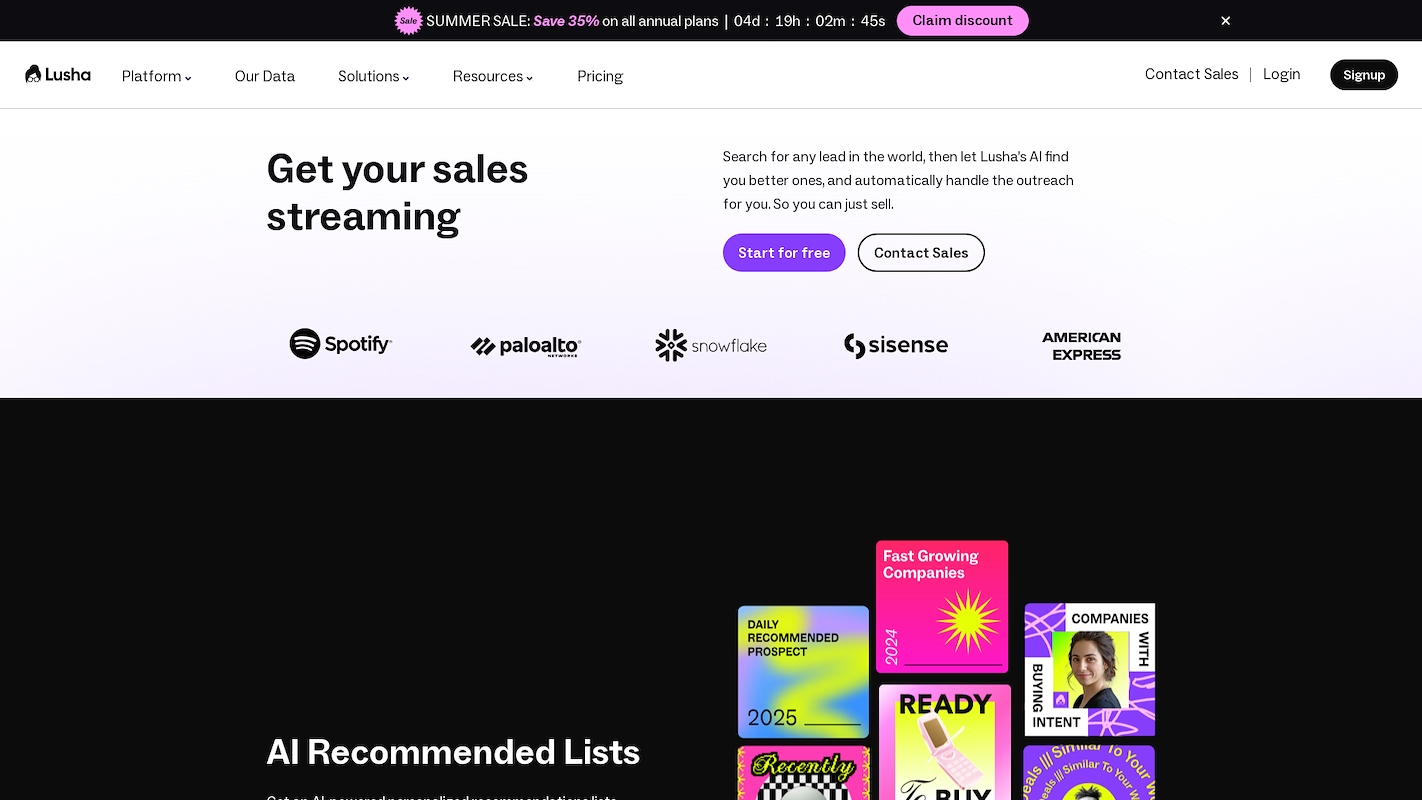
Lusha is a sales intelligence platform for revenue teams. It helps find B2B leads across the globe and provides AI recommendations for similar prospects. The platform automates multichannel outreach within a single workflow and emphasizes compliance with GDPR and CCPA.
Teams use it to build prospect lists, prioritize outreach with buyer-intent signals, and automate email sequences. It also integrates with popular CRMs and sales tools to support data discovery and engagement.
Lusha's Main Features
- Offers AI-recommended lists of companies and decision-makers based on an ideal customer profile.
- Provides buyer intent data and real-time alerts to identify prospects who are actively in-market.
- Records and analyzes sales meetings to generate insights.
- Automates and personalizes email sequences with AI-driven copy.
How Lusha Compares to Hunter
Average Review score: 4.3/5 stars based on 1,516 G2 reviews.
- Lusha offers AI Prospect Playlists that automatically generate and refresh lead lists, a more dynamic approach compared to building static lists in Hunter.
- The tool provides buyer intent data to identify prospects actively researching solutions, which offers more targeted leads than Hunter's basic contact discovery.
- It finds direct phone numbers in addition to emails, providing an alternative outreach channel, whereas Hunter focuses primarily on email addresses.
- This platform includes a feature to record and analyze sales meetings for insights, a function for sales coaching that is not part of Hunter's toolset.
Where Lusha Compares to Hunter
- Some users report that Lusha's contact data can occasionally be outdated. This may happen because it covers many data points, while Hunter focuses specifically on email verification, which can result in higher accuracy for that single task.
- The platform's extensive features might be complex for teams that only need to find emails. In contrast, Hunter provides a more direct user experience for its core function of email discovery and verification.
- This tool is designed for finding individual contacts and enriching data. It is less focused on bulk email verification for cleaning large lists, a core feature that Hunter provides for users who manage extensive email databases.
Pricing and Cost-Effectiveness
Lusha offers a more affordable entry point with its Pro plan at $36 per month, compared to Hunter's Starter plan at $49 per month. The price gap increases at higher tiers, as Lusha's Premium plan is $59 per month while Hunter's Growth plan costs $149 per month. For complete pricing details, visit Lusha's official website.
4) Clearbit
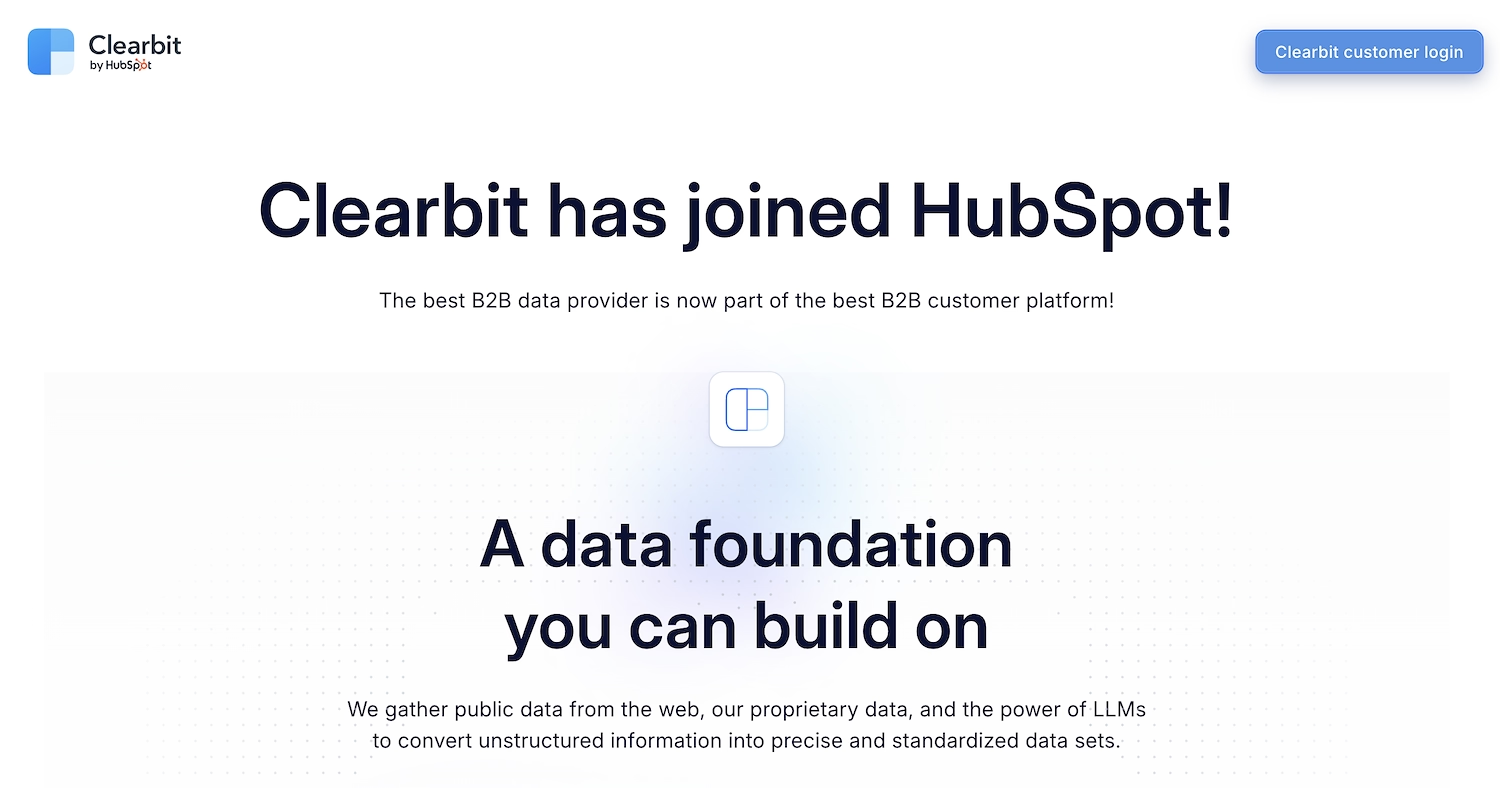
Clearbit is a marketing intelligence platform that provides data for B2B companies. It helps enrich contact records, identify new prospects, and personalize sales interactions. Businesses use the tool to find accounts that match an ideal customer profile and to understand website visitors.
The platform also offers email verification to improve data accuracy and integrates with many sales and marketing tools.
Clearbit's Main Features
- Enriches lead, contact, and account records with firmographic and demographic details.
- Scores and routes leads in real time using deep industry classifications and corporate hierarchy mapping.
- Identifies anonymous website visitors who show buying intent and match the ideal customer profile.
- Shortens web forms by automatically removing fields it can enrich to help increase conversion rates.
How Clearbit Compares to Hunter
Average Review score: 4.4/5 stars based on 626 G2 reviews.
- Clearbit enriches records with over 100 data points, including firmographic and demographic details. This provides deeper context than Hunter, which focuses on finding and verifying email addresses.
- The tool identifies anonymous website visitors who match an ideal customer profile. This offers a proactive way to find leads, unlike Hunter's method of searching for specific contact information.
- It scores and routes leads in real time based on custom criteria. This helps sales teams prioritize efforts, a function not central to Hunter's email discovery toolset.
- This platform shortens web forms by auto-filling known information, which can help increase conversion rates. Hunter does not offer a comparable feature for website optimization.
Where Clearbit Compares to Hunter
- Clearbit does not focus on bulk email discovery. For example, Hunter's Domain Search finds all available emails from one company domain, a function that is not a primary feature of Clearbit.
- The platform does not have built-in tools for email outreach. Hunter, by contrast, lets users find contacts and then start an email campaign within the same tool.
- Its pricing and features often target large enterprise accounts. Hunter, in comparison, offers more accessible plans for small businesses that need a straightforward email finder.
Pricing and Cost-Effectiveness
Clearbit does not publicly list its pricing, as it is geared toward enterprise clients who receive custom quotes. In contrast, Hunter offers transparent pricing tiers, with a Starter plan at $49 per month and a Growth plan at $149 per month. For specific pricing details, you can visit Clearbit's official website.
5) RocketReach
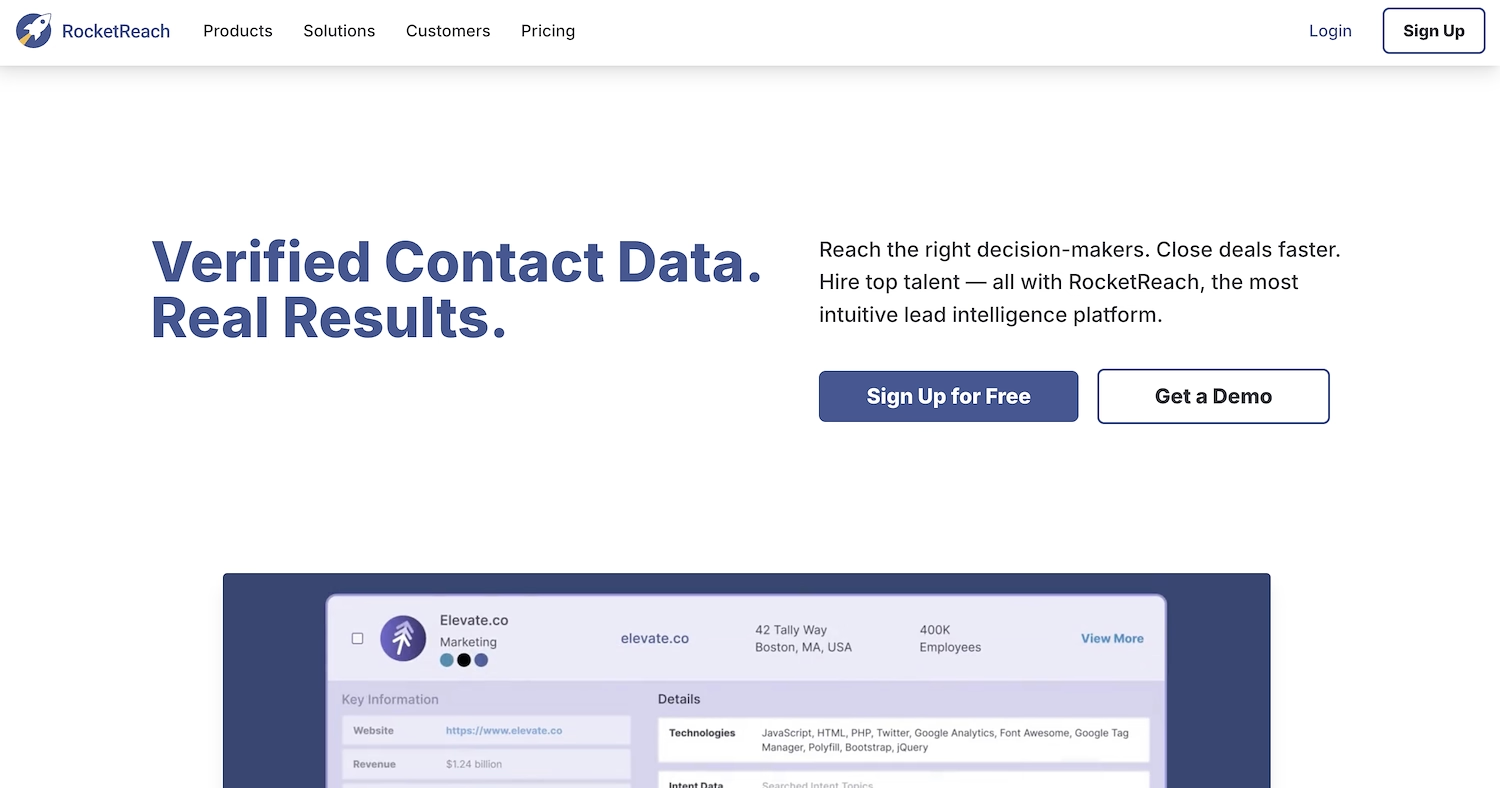
RocketReach is a platform to find contact information for professionals. It offers a database with emails, phone numbers, and social links for over 700 million people at 35 million companies worldwide.
Sales, recruiting, and marketing teams use the tool to identify and connect with decision-makers. The platform supports data discovery and outreach efforts.
RocketReach's Main Features
- Offers a database of over 700 million professionals at 35 million companies.
- Provides multiple contact points for prospects, including emails, phone numbers, and social links.
- Supports data discovery efforts for sales, recruiting, and marketing teams.
How RocketReach Compares to Hunter
Average Review score: 4.4/5 stars based on 918 G2 reviews.
- RocketReach provides access to a database of over 700 million professionals. This offers a wider pool of potential contacts compared to Hunter's more focused database.
- The tool finds direct phone numbers and social media links for prospects. This provides more outreach channels than Hunter, which concentrates on email addresses.
- It offers specialized contact data for industries like healthcare. This helps teams find professionals in niche sectors, a more targeted approach than Hunter's general search.
- The platform uses intent data to create contact lists. This helps marketing teams find prospects who show buying signals, a feature not available in Hunter's core toolset.
Where RocketReach Compares to Hunter
- Some users report that contact information in RocketReach is occasionally out of date. This can happen with very large databases. Hunter’s focus on email verification, in contrast, may offer more accuracy for that specific task.
- The platform lacks a native tool to send email campaigns. Users must integrate with a separate outreach service, while Hunter combines email discovery and outreach in one place.
- Unlike Hunter, it does not offer a bulk domain search to find all emails from one company. This feature in Hunter helps users who need to prospect entire organizations.
Pricing and Cost-Effectiveness
RocketReach's Essentials plan starts at $99 per month, while Hunter's Starter plan is $49 per month. Hunter is also more affordable at the next tier; its Growth plan is $149 per month compared to RocketReach's Pro plan at $165 per month.
Explore a Digital Workforce with 11x
If you are looking for a solution beyond traditional sales tools, consider adding digital workers to your team. This approach focuses on automating entire sales roles rather than just specific tasks.
The 11x platform provides AI agents that handle functions like lead generation, outreach, and CRM management. This allows your sales team to focus on closing deals instead of manual prospecting.
To see how specialized AI agents could support your sales objectives, learn more about the 11x platform. It offers a different way to build and scale your go-to-market operations.
With 11x, we run your sales playbook from start to finish. Our AI agent Alice finds accounts and handles outreach, while Julian qualifies leads and books meetings. We combine functions like intent data and email warmup on one platform, which removes the need for separate tools.
Book a demo to see how it works.
6) ZoomInfo SalesOS
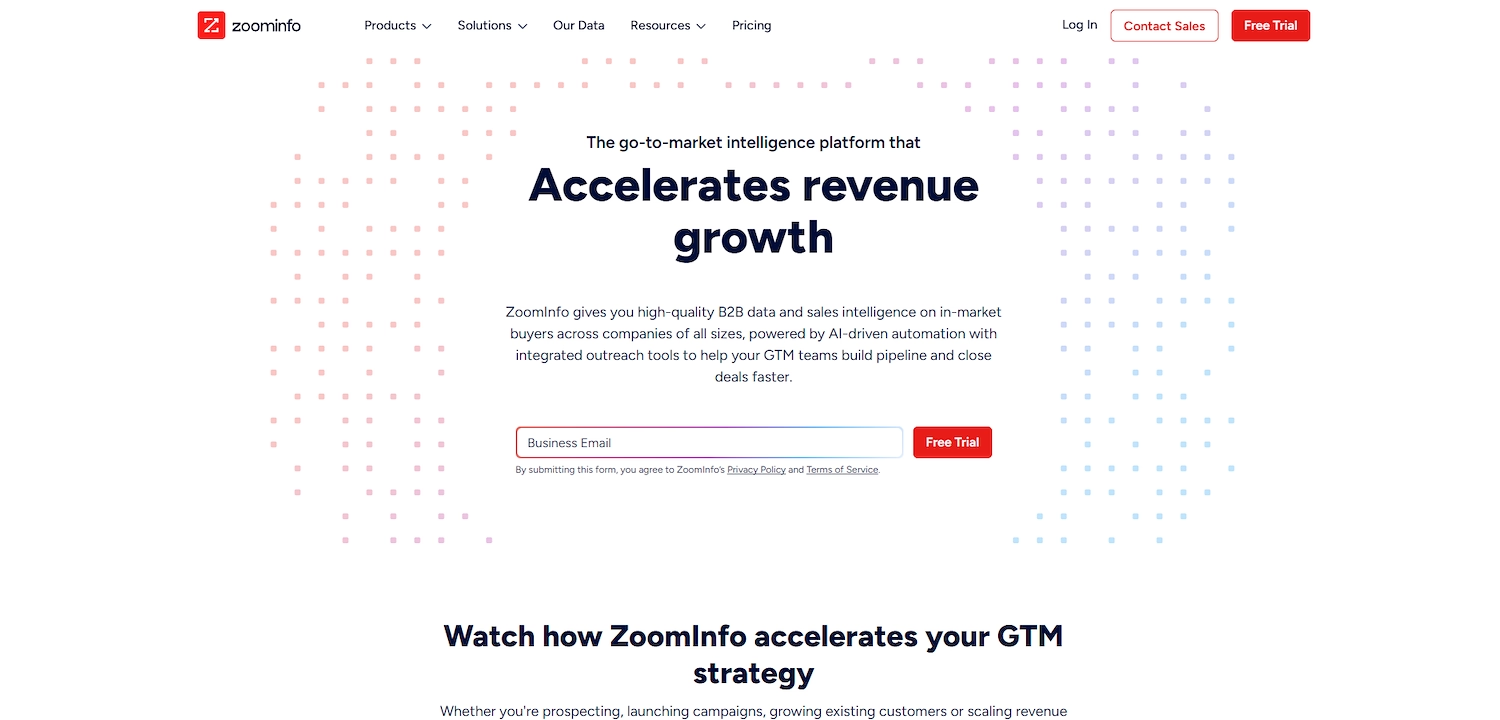
ZoomInfo SalesOS is a B2B intelligence platform that offers a database of company and contact information. Teams use it to find prospects, get verified contact details for outreach, and identify key decision-makers to support their go-to-market strategy.
ZoomInfo SalesOS's Main Features
- Identifies anonymous website visitors and provides real-time buyer intent signals to find prospects.
- Analyzes call and meeting interactions to generate sales insights.
- Triggers go-to-market activities automatically through customizable workflows.
- Offers a generative AI companion that surfaces insights and drafts outreach copy.
How ZoomInfo SalesOS Compares to Hunter
Average Review score: 4.5/5 stars based on 8,738 G2 reviews.
- ZoomInfo SalesOS offers a larger and more frequently refreshed database of company and contact information, which provides more lead opportunities than Hunter's contact list.
- It includes an AI companion that gives recommendations on who to contact and what to say, a feature for sales guidance that Hunter does not offer.
- The tool identifies anonymous website visitors and provides buyer intent signals to help teams find active prospects, unlike Hunter's direct search function.
- This platform analyzes sales calls and meetings to generate coaching insights, a feature that supports sales performance improvement beyond Hunter's focus on contact discovery.
Where ZoomInfo SalesOS Compares to Hunter
- Some users report that its vast database can sometimes contain outdated information. Hunter's specific focus on email verification may result in higher accuracy for that single task.
- The platform does not offer a bulk domain search to find all emails from one company. Hunter provides this feature, which helps users who need to prospect entire organizations at once.
- Its pricing model is often geared toward enterprise clients with custom quotes. In comparison, Hunter offers transparent and more accessible plans for small businesses that need a straightforward email finder.
Pricing and Cost-Effectiveness
ZoomInfo SalesOS does not publicly list its pricing, as it is geared toward enterprise clients who receive custom quotes. In contrast, Hunter offers transparent pricing tiers, with a Starter plan at $49 per month. For specific pricing details, you can visit the official ZoomInfo website.
7) Voila Norbert
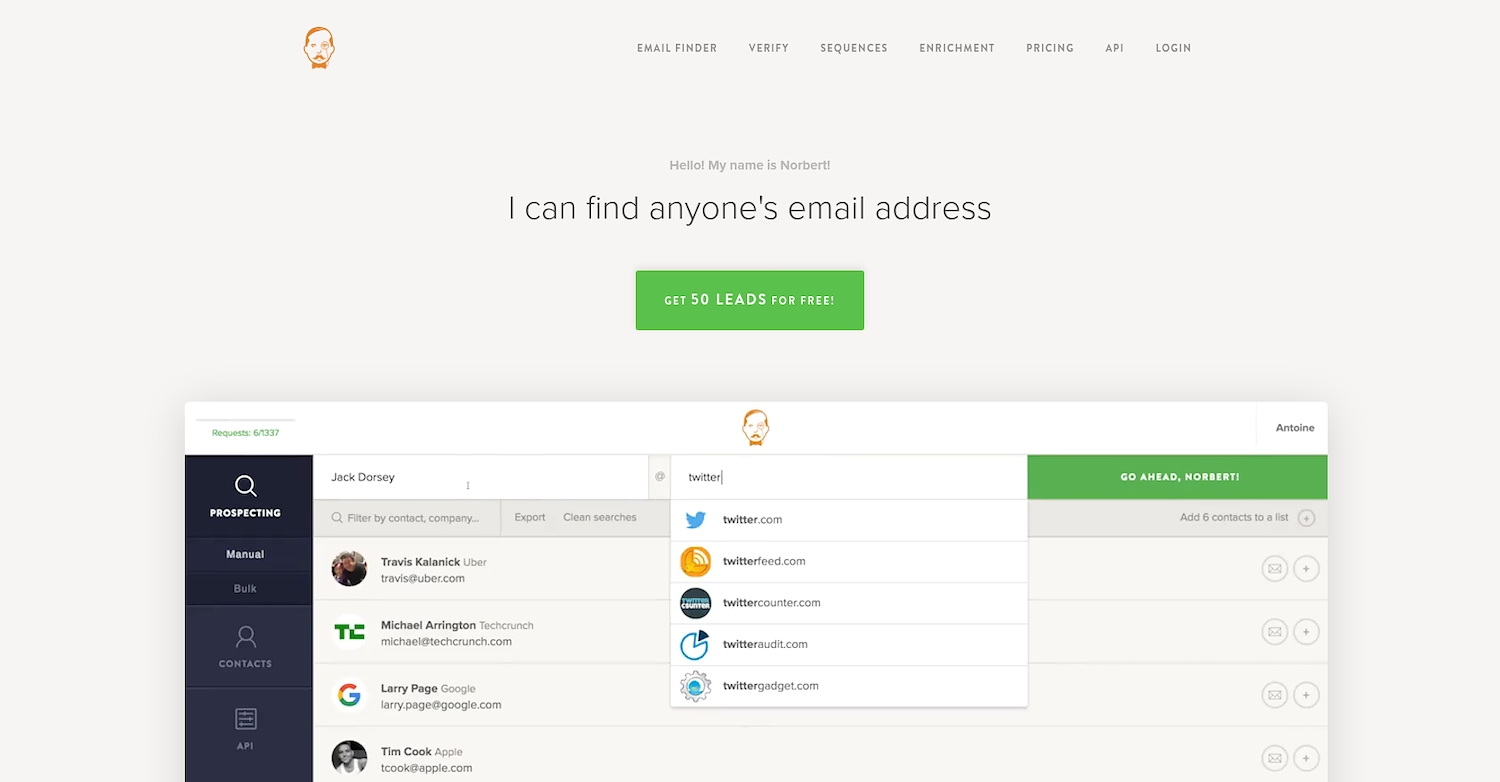
Voila Norbert is a platform to find and verify email addresses. Sales and marketing teams use it for email outreach to connect with leads. The tool focuses on data accuracy, which helps users build clean contact lists before they launch a campaign.
Voila Norbert's Main Features
- Finds verified email addresses and provides a certainty score for each result.
- Enriches contact lists by appending job titles, company details, locations, and social profiles.
- Automates email outreach with features like AI email writing, inbox rotation, and A/B testing.
- Offers a prospect finder to search for contacts by title, company, or location.
How Voila Norbert Compares to Hunter
Average Review score: 4.6/5 stars based on 84 G2 reviews.
- Voila Norbert provides a certainty score with each email it finds, which offers a confidence level for data accuracy. Hunter verifies emails but does not provide a similar scoring system.
- The tool enriches contact lists with details like job titles and social profiles. This provides more context for outreach than Hunter, which focuses mainly on email discovery.
- It offers advanced email outreach automation, including inbox rotation and A/B testing. These features give more control over campaigns compared to Hunter's more direct outreach tool.
- This platform includes a prospect finder to search for contacts by title or location, which allows for more targeted list building than Hunter's domain-based search approach.
Where Voila Norbert Compares to Hunter
- Voila Norbert does not offer a bulk domain search. This is different from Hunter, which lets users find all available emails from a single company domain for broad prospecting.
- The tool can sometimes be slower when it verifies very large email lists. In comparison, Hunter often processes bulk verification tasks more quickly due to its specialized focus.
- Some users find its interface less intuitive than Hunter's straightforward design. This may mean a slightly longer adjustment period for new teams that need to start right away.
Pricing and Cost-Effectiveness
Hunter's Starter plan is priced at $49 per month. Since pricing models can vary, for the most accurate and up-to-date information on Voila Norbert, we recommend visiting Voila Norbert's official website for a direct comparison.
8) FindThatLead
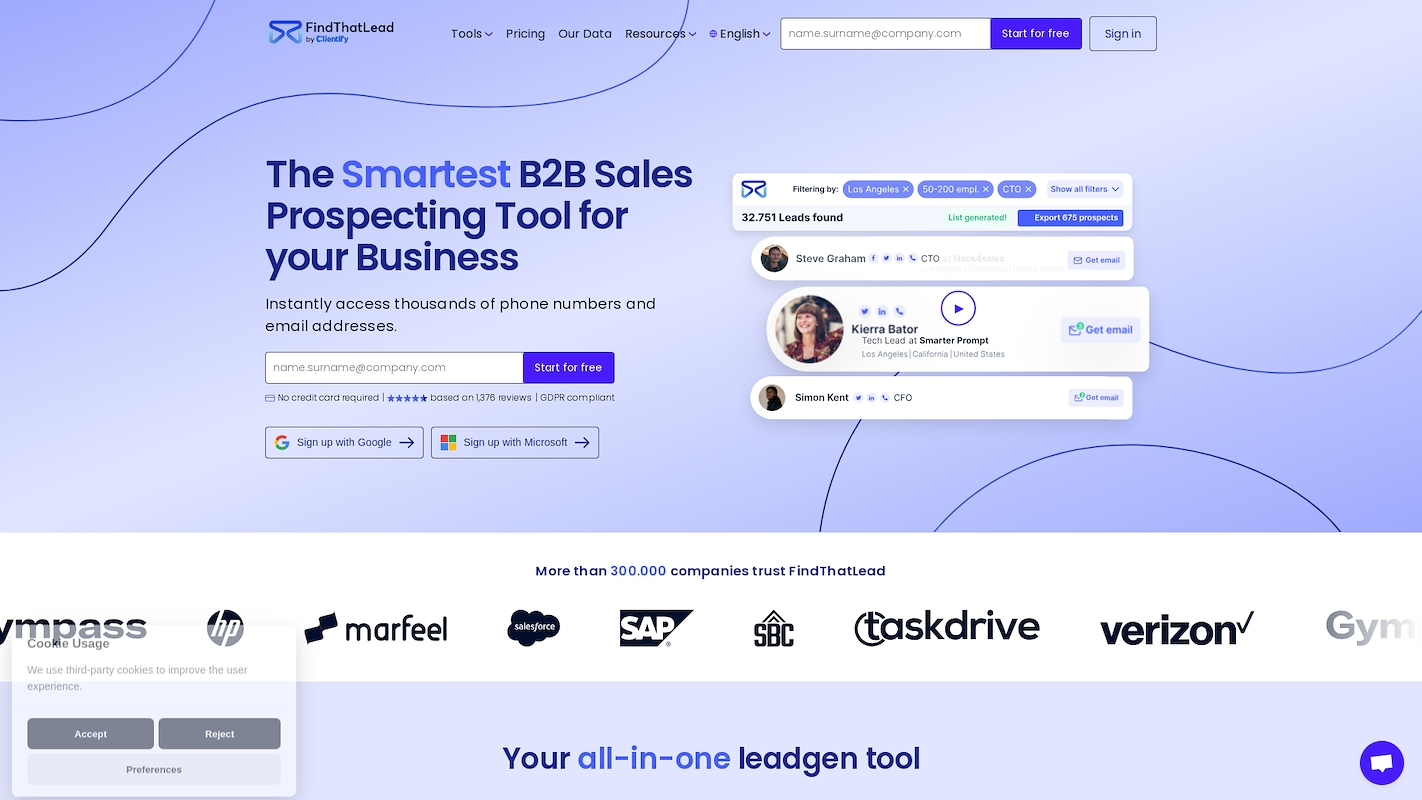
FindThatLead is a B2B platform for sales prospecting. It provides tools to find and verify professional email addresses. Businesses use it to build targeted lead lists and execute cold email outreach campaigns. The main goal is to help sales teams connect with new prospects and generate leads.
FindThatLead's Main Features
- Generates segmented lists of qualified prospects.
- Verifies emails automatically to clean contact lists.
- Enriches existing databases with additional contact and company data.
- Includes tools to personalize and send cold email campaigns.
How FindThatLead Compares to Hunter
Average Review score: 4.0/5 stars based on 90 G2 reviews.
- FindThatLead includes a built-in CRM to manage customer portfolios. This is different from Hunter, which requires integration with external CRM tools for pipeline management.
- The tool offers a Chrome extension specifically for finding emails from LinkedIn profiles. This provides a focused workflow for social selling, while Hunter's extension is for general website email discovery.
- It allows users to generate segmented prospect lists based on specific criteria. This approach differs from Hunter's primary feature of bulk email searches by company domain.
- This platform combines lead generation, email verification, and mass email campaigns. Hunter, in comparison, has a stronger focus on the specific tasks of email finding and verification.
Where FindThatLead Compares to Hunter
- Some users report that its contact data can be outdated. Hunter's specific focus on email verification may result in higher accuracy for that single task, as it is a more specialized tool.
- The tool lacks a bulk domain search feature. In comparison, Hunter lets users find all available emails from one company domain, which helps users who prospect entire organizations.
- Its all-in-one platform can be complex for teams that only need to find emails. Hunter, in contrast, provides a more direct user experience for its core function of email discovery.
Pricing and Cost-Effectiveness
While we've covered key features and use cases in this comparison, pricing models can vary significantly between tools. For the most accurate and up-to-date pricing information, we recommend visiting FindThatLead's official website.
9) Skrapp.io
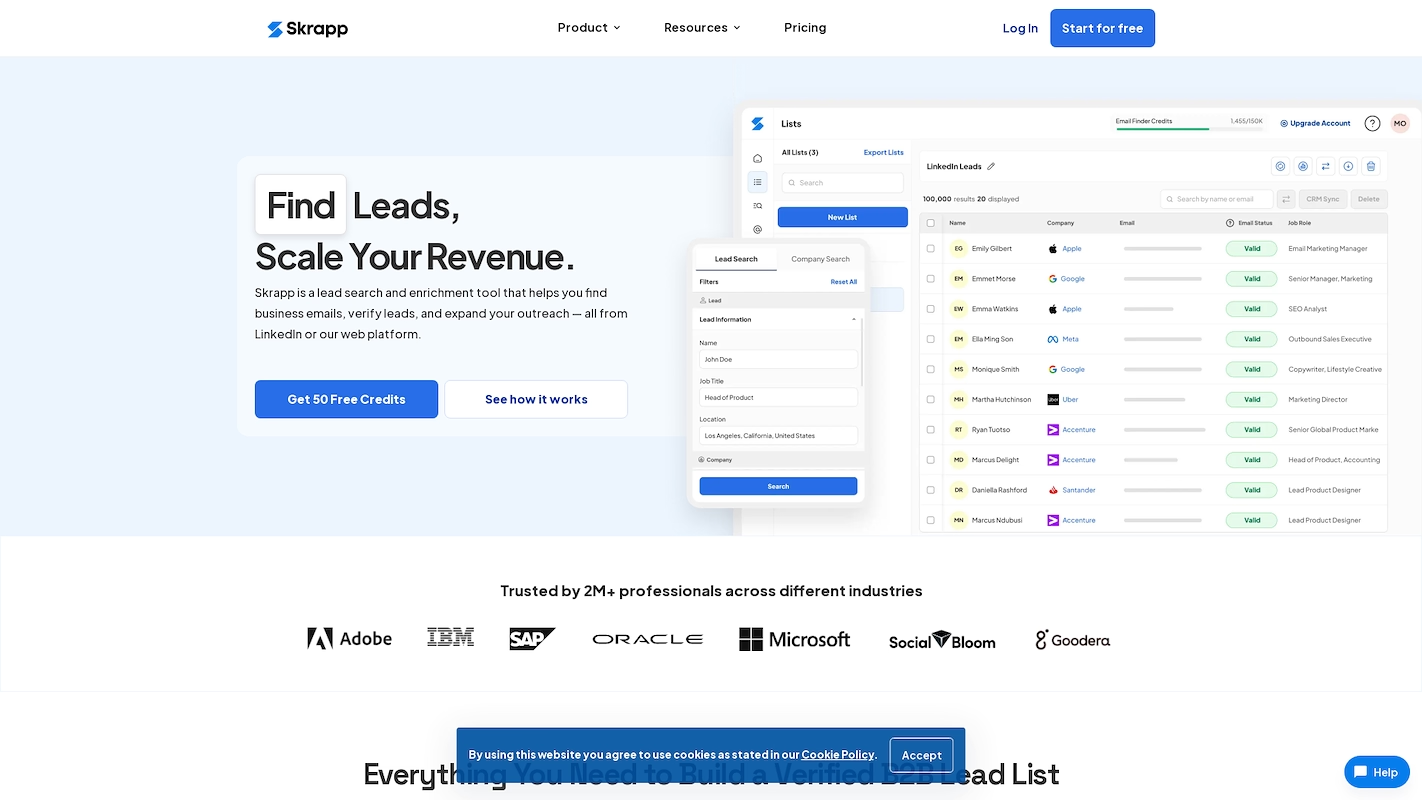
Skrapp.io is a platform for B2B outreach. Businesses use it to find and verify professional email addresses. The tool helps sales and marketing teams build contact lists for their campaigns, with a focus on email discovery and lead generation from professional data sources.
Skrapp.io's Main Features
- Offers access to a database with over 150 million leads from 20 million global companies.
- Integrates with LinkedIn, Sales Navigator, and CRM platforms like HubSpot and Salesforce.
- Includes an email verifier tool with a 97% accuracy rate.
- Builds prospect lists that match an ideal customer profile.
How Skrapp.io Compares To Hunter
Average Review score: 4.2/5 stars based on 170 G2 reviews.
- Skrapp.io offers a specialized Chrome extension that works directly with LinkedIn and Sales Navigator, a different approach from Hunter's more general website extension.
- The tool provides access to a database of over 150 million leads, which can offer a larger pool of contacts compared to Hunter's database.
- It includes an email verifier with a stated 97% accuracy rate. This provides a specific benchmark for data quality, while Hunter also verifies emails as a core function.
- This platform features native integrations with major CRMs like HubSpot and Salesforce. This creates a more direct data sync compared to Hunter's workflow.
Where Skrapp.io Compares to Hunter
- The platform does not include a bulk domain search feature. This is different from Hunter, which allows users to find all available emails from a single company domain at once.
- It focuses on finding contact data and requires a separate tool for outreach. Hunter, in contrast, combines email discovery and a campaign sender on one platform.
- Some users report that email accuracy can be lower for smaller companies. Hunter's specialized verification process may offer more consistent results for these specific use cases.
Pricing and Cost-Effectiveness
Skrapp.io's Professional plan and Hunter's Starter plan are both priced at $49 per month. However, Skrapp.io offers a more cost-effective option for scaling, with its next tier at $99 per month compared to Hunter's Growth plan at $149 per month.
10) UpLead
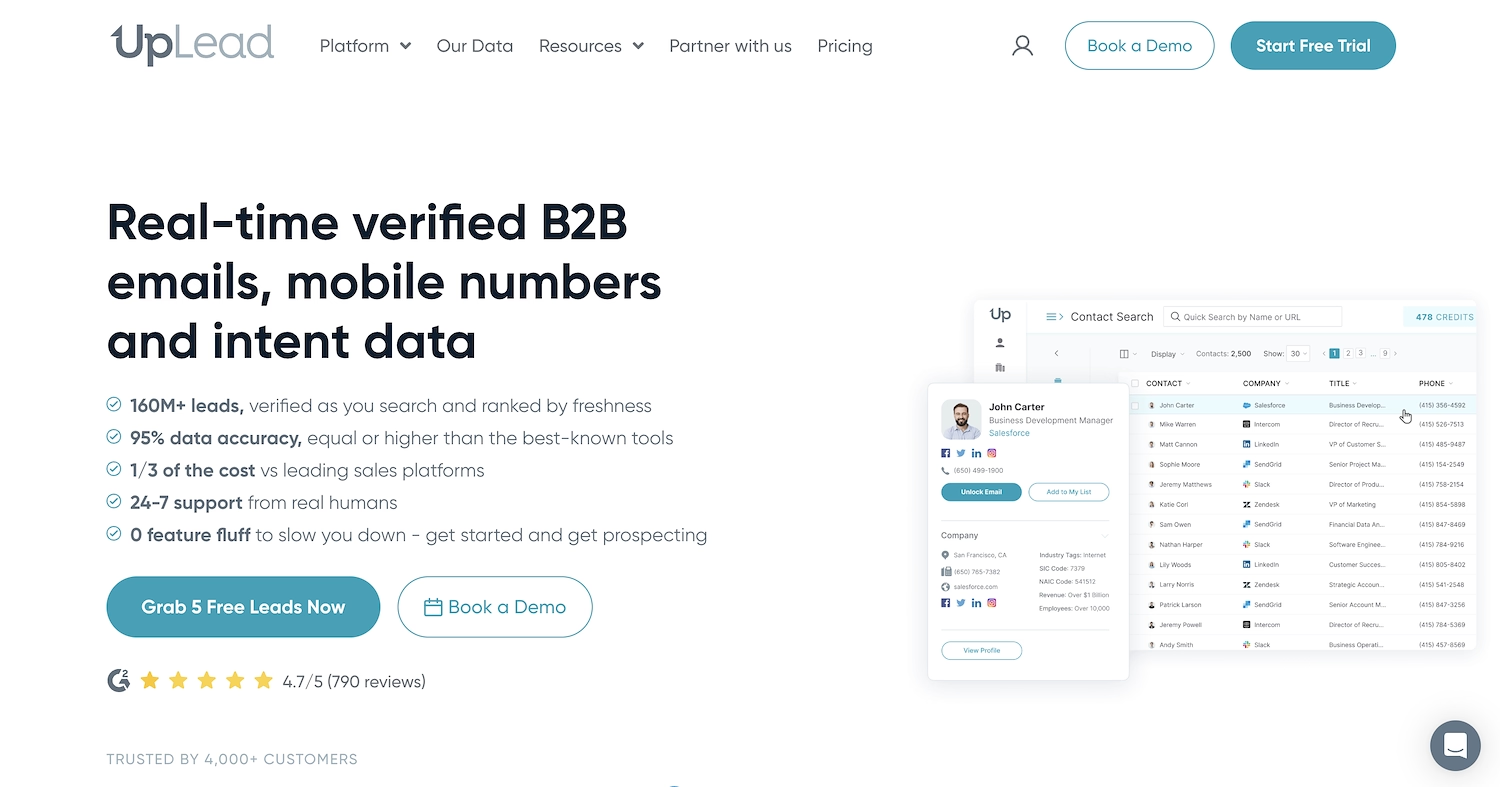
UpLead is a B2B data provider for sales and marketing teams. It offers a database of contacts and companies to build targeted lists and find verified email addresses. The platform focuses on data accuracy to help users connect with qualified prospects for their outreach efforts.
UpLead's Main Features
- Provides real-time verified emails and intent data to find in-market buyers.
- Offers over 50 search filters to build targeted prospect lists.
- Enriches contact and company data to clean and update existing databases.
- Integrates with CRMs like Salesforce and HubSpot to automate workflows.
How UpLead Compares To Hunter
Average Review score: 4.7/5 stars based on 797 G2 reviews.
- UpLead offers real-time email verification, which provides immediate accuracy checks. This is different from Hunter's standard verification process.
- It provides intent data to identify prospects who actively search for solutions. Hunter, in comparison, does not offer this feature for lead targeting.
- The tool includes over 50 search filters, such as technology tracking. This allows for more specific list creation compared to Hunter's broader search options.
- This platform finds direct mobile numbers in addition to emails. This gives an extra outreach channel that is not available in Hunter, which focuses on email addresses.
Where UpLead Compares to Hunter
- UpLead does not have a bulk domain search feature. This is different from Hunter, which allows users to find all emails from a single company domain at once.
- The tool focuses on data discovery and requires a separate service for sending email campaigns. Hunter, in contrast, combines email finding and outreach tools on one platform.
- Its entry-level plan starts at a higher price point compared to Hunter. This can make it a less suitable option for small teams or users with a limited budget.
Pricing and Cost-Effectiveness
UpLead's Essentials plan starts at $99 per month, while Hunter's Starter plan is $49 per month. This makes Hunter a more cost-effective option for teams that need an entry-level package.
Which One Should You Go With?
Choosing the right Hunter alternative depends on your team's specific needs, budget, and existing workflow. This guide analyzed several options to help you evaluate which tool best fits your go-to-market strategy.
If you are looking for a solution beyond individual tools, 11x offers a digital workforce to manage sales functions. Its AI agents handle tasks like prospecting and outreach, allowing your team to focus on closing deals.




